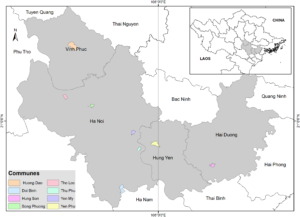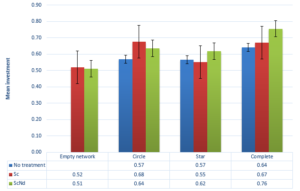Food safety in VN is at the top of social concerns. The current state of agricultural policies show that there is a real need for regulation and for new practices. If the society’s concerns are important to know, producers (farmers) are not really encouraged to adopt new practices.
However, due to a lack of incentives, Vietnamese farmers could be incentivized by non-monetary incentives as neighbors’’ behaviors, social comparisons, existence of leaders in the villages.
Methodologies
First, we will test these hypotheses using modeling and field experiments.
- We model the impact of both networks and social comparisons (comparing to others or to a norm) on individual decisions and we will test empirically the theoretical results in a field experiment in Vietnam.
- Then we model the impact of different leaders, formal and informal, on individual decisions and we will test empirically the theoretical results in a field experiment.
This part necessitates to identify the leaders, knowing that there are formal and informal ones in each village, but they are key players in the network, influencers: the leader is the one who links to every other individuals and sometimes has a strong influence on others’ behaviors.
Second, adopting new practices necessitates as well to better identify the determinants of changing fertilization practices and to measure farmers’ preferences for widespread use of bio-based fertilizers. A choice experiment in the region of Hanoi will be implemented. This methodology will help to estimate farmers’ efforts to take organic farming and the main attributes that could drive their willingness to pay.
Finally, a survey on farmers as households will be conducted next year aiming at estimating their happiness and their well-being.


DATA
In total, 220 small household farmers took part in the lab-in-the-field experiment. The 22 experimental sessions were divided equally across geographic locations, with ten farmers in each experimental session. The participants were all farmers living in rural areas, aged from 16 to 78 years, across eight villages of four different provinces (Vinh Phuc, Hung Yen, Hai Duong, Ha Noi) in Northern Vietnam. These provinces around Hanoi were chosen because they produced the most agricultural products (vegetables, rice and fruits) for Northern Vietnam. The experiments were conducted in the village where the participants lived.

Results
Our lab-in-the-field experimental study suggests the critical role of information nudge in promoting farmers in a centralized network (e.g., a star network) to move toward more environmentally-friendly agriculture. Moreover, our DCE study suggests the crucial role of sales contracts with either flexible or guaranteed prices and the presence of neighborhood farmers engaged in organic farming in supporting organic agriculture in Vietnam.

Policy implications
Firstly, it is crucial for farmers to understand the importance of their social links. In many instances, neighborhood farmers or local agricultural organizations are valuable sources of knowledge, information, and advice. Consequently, policymakers and/or individuals themselves should always try to establish a channel for local farmers to promote farmer-to-farmer links.
Secondly, it is always challenging to observe the actual network structure in reality, and farmers cannot fully observe their neighbors’ behaviors, actions, or decisions. In this situation, providing social comparison treatment like information about the average organic investment of the local groups or communities to farmers could stimulate self-evaluation and competition and could thus help incentivize farmers to behave positively towards organic farming.
Thirdly, timely reminders about the importance of organic agriculture and the socially optimal organic investment (i.e., information nudge) can help increase farmers’ awareness about organic agriculture and help them maintain commitments and schedules. As a result, it helps to nudge them towards bridging the gap between their intentions and actions.
Finally, besides the aforementioned social factors, market factors like “contract farming” (i.e., the purchaser provides farmers with credit, technical advice, market services, etc. In return, farmers produce a certain quantity and quality of products and sell them to the purchaser), could positively contribute to farmers’ revenues, in particular, as well as to growth and the reduction of poverty, in general.


Itís difficult to find knowledgeable people in this particular subject, however, you seem like you know what youíre talking about! Thanks
A fascinating discussion is definitely worth comment. I believe that you ought to publish more on this subject, it might not be a taboo subject but usually people do not discuss such topics. To the next! Many thanks!!
You ought to take part in a contest for one of the best sites on the net. I will highly recommend this blog!
Id like to thank you for the efforts you have put in penning this site. Im hoping to see the same high-grade blog posts by you in the future as well. In fact, your creative writing abilities has inspired me to get my own site now 😉
Everything is very open with a clear description of the issues. It was definitely informative. Your site is extremely helpful. Thanks for sharing!
I have to thank you for the efforts you have put in writing this site. I really hope to view the same high-grade content by you later on as well. In fact, your creative writing abilities has inspired me to get my very own blog now 😉
May I simply say what a comfort to discover somebody who genuinely knows what they are talking about over the internet. You actually understand how to bring a problem to light and make it important. More people ought to check this out and understand this side of the story. I cant believe you arent more popular because you surely possess the gift.
Everything is very open with a really clear description of the issues. It was definitely informative. Your site is useful. Thank you for sharing!